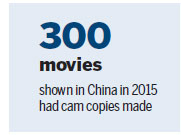Movies go high-tech to curb the scourge of pirate cam releases
Experts say new technologies like watermarking key to winning battle for cinema sector
The Chinese and US movie industries are working hard together using advanced technologies to fight so-called "cam" releases - pirated copies made by recording onscreen film projections in cinemas, insiders said at a recent copyright seminar in Beijing.
Cam stands for camrip or camming, which is derived from camcorder.
Yu Cike, director of the copyright management department at the National Copyright Administration, said at the seminar that copyright is an important foundation for the existence and development of the cultural and creative industries.
The rapid development of China's movie sector over recent years is the result of the industry's reforms, financial support and improved copyright environment, he said.
However, camcorder piracy is still a severe challenge to the industry.
"Organized piracy groups use professional video cameras to record movies in cinemas from time to time, and the quality of the pirated copies is improving," said Zhang Wei, head of the film technology and quality testing center at the State Administration of Press, Publication, Radio, Film and Television.
She said about 400 movies were shown in Chinese cinemas in 2015, and more than 300 of them had cam copies.
"Many cam copies were released in the first two days after a movie's launch, causing huge box office losses," Zhang said.
Digital watermarking technology is one of the major methods to fight against cam piracy.

The technology embeds watermarks in each authentic copy in the cinemas, which cannot be seen with the naked eye.
When pirated versions are found, the watermark analysis system can find out the location and time of the illegal shooting in an hour. That information can be use as evidence for moviemakers, publishers and cinemas.
Since 2016, the Chinese center and the Motion Picture Association of America have jointly launched 30 investigations into piracy of 17 movies produced by six members of the MPAA, using the technology.
The movies include Pirates of the Caribbean: Dead Men Tell No Tales, Beauty and the Beast, The Fate of the Furious, Wonder Woman and Transformers: The Last Knight.
"We should strongly promote the application of the digital watermarking technology, and improve the movie producers and publishers' understanding of copyright protection," said Han Xiaoli, director-general of the association for movie publishing and showing.
Feng Wei, vice-president of MPAA Asia Pacific and chief representative of the MPAA's China office, said: "Cam piracy harms not only the interests of movie producers, but also the publishers and cinemas, in fact the entire movie industry chain."
He suggested the industry associations, cinemas, copyright owners and law enforcement authorities cooperate to deter the illegal recording and secure healthy order in the market.
Delegates at the seminar also called for a long-term piracy defense mechanism and a one-stop service system that includes early warning functions, supervision, location functions and blockage of online links.
zhangzhao@chinadaily.com.cn
|
A woman takes a photo of a poster for Beauty and the Beast at a cinema in Yichang, Hubei province.Liu Junfeng / For China Daily |
(China Daily 10/26/2017 page17)















